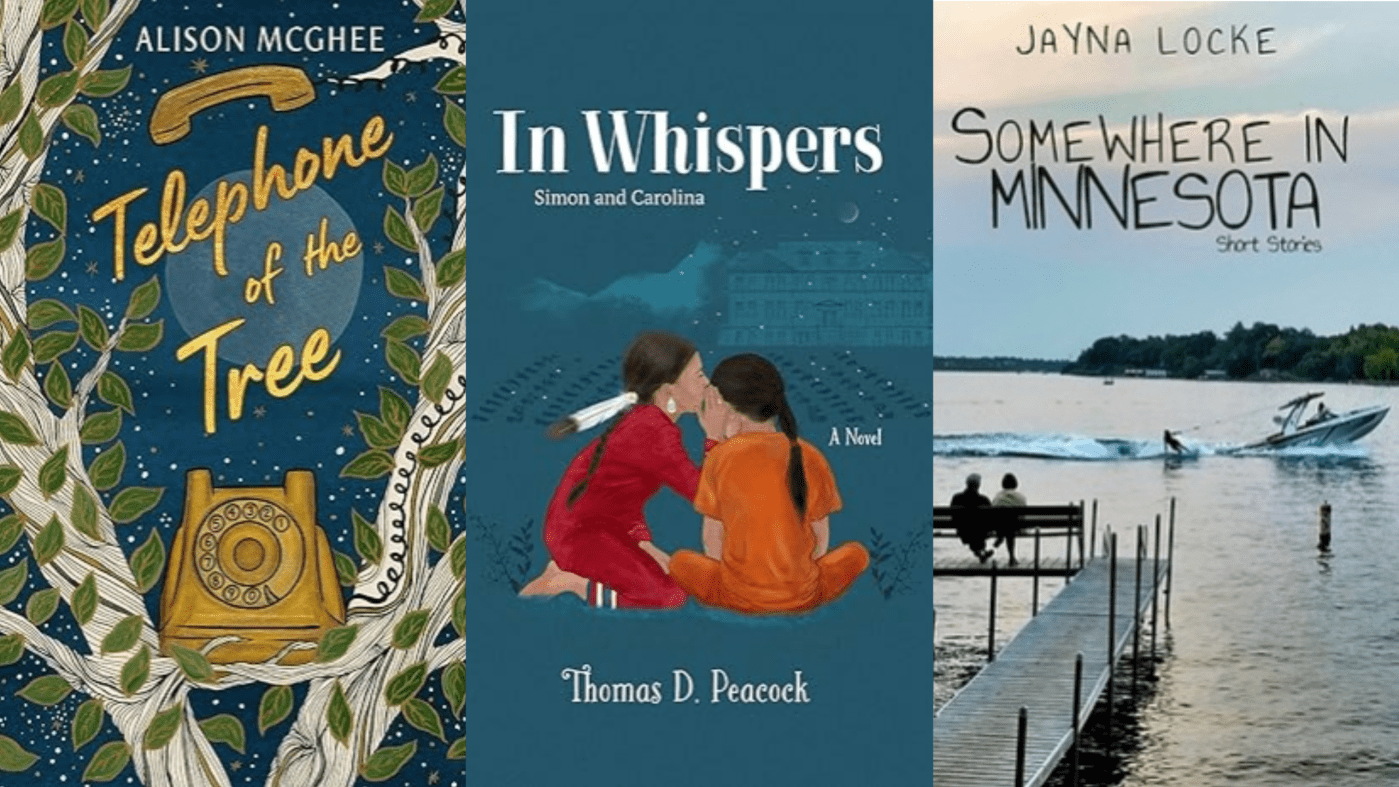
Readers and writers: Novels of grief and love, and a story collection
Take your pick today. A young adult novel about grieving, an Indian love story, and a short story collection set from the Twin Cities to Lake Superior.
“Telephone of the Tree”: by Alison McGhee (Rocky Pond Books, $17.99)
(Courtesy of Rocky Pond Books)
Maybe the telephone of the tree is a gift of the tree, to/the humans who need it. — from “Telephone of the Tree”
Alison McGhee, winner of four Minnesota Book Awards, writes novels for adults and middle-grade readers as well as picture books for children. “Telephone of the Tree,” told in page-long prose poems, is a middle-grade reader’s story about a girl coping with grief.
Ayla is 10 and counting down the days to when her best friend Kiri returns. Kiri went away but Ayla is sure she will be home for her 11th birthday party. Ayla misses her friend so much she collects all her “Kiri things” in the house, including the trick candles they use every year on their birthday cakes. She misses her friend the most when she looks down the block lined with trees planted over three generations to honor deceased neighbors and welcome babies. Ayla’s is a river birch and Kiri’s a white pine. The girls share a love for these trees and spend hours perched in their branches. They are so attuned to the trees they want to become them.
Alison McGhee (Courtesy of the author)
As Ayla waits impatiently for Kiri to come back, she ignores strange looks she gets from classmates who she insults when they offer to walk to school with her. She hates to see the patient concern in her parents’ eyes. She tries to tune out the nightmares of “that day.” Then, an old-fashioned telephone appears in the branches of a nearby tree. Nobody knows how it got there, least of all Ayla. A curious thing happens; a delivery boy picks up the receiver and talks into it. He goes away happy. Soon, more people use the phone, including a man with a toddler who assures the listener they are OK, and an elderly widow recalling happy times.
Eventually, Ayla is forced to confront what really happened that dark day during the thunderstorm when she and Kiri were chasing the dog across the street.
McGhee says her story is partly inspired by the real “wind phone” phenomenon, the grief tool that allows visitors to imagine one-way conversations with deceased loved ones via an unconnected rotary phone that originated in Japan after the 2011 tsunami and earthquake.
A New York Times bestselling author, McGhee’s “Shadow Baby” was a Today Show book club pick and Pulitzer Prize nominee. Writing with Kate DiCamillo, their book “Bink and Gollie” won the American Library Association Geisel Award. She’s taught creative writing at Metropolitan State University, Hamline University’s MFA program and Vermont College. “Telephone of the Tree” won starred reviews from Kirkus and the Bulletin of the Center for Children’s Books.
“In Whispers: Simon and Carolina”: by Thomas D. Peacock (Dovetailed Press, $16.95)
(Courtesy of Dovetailed Press)
Now, as an old woman looking back to that time in all its innocence. I, then just a young woman, keenly aware of the teachings of my mother and aunties of my responsibility to save myself for marriage. Simon, innocent himself, respectful of me, maybe too shy and hesitant, maybe too ignorant to know what to do. I will never know. Still, it was love. I cannot lessen or deny it was, that young love is entirely possible, indeed. — from “In Whispers”
Thomas Peacock, a member of the Fond du Lac Band of Lake Superior, melds the tenderness of first love with hard lives of some Native Americans in this novel that is perfect for romantics.
Simon, 13, and 14-year-old Carolina meet at St. Mary’s Mission boarding school in Granite Falls in 1957. They are forbidden to speak their Ojibwe language, so they meet behind the girls’ dorm to communicate in whispers. When Carolina is abused, Simon runs away with her and sees her safely home. Then, they part for years with their lives taking different paths.
Thomas Peacock (Courtesy of the author)
Carolina, who is a healer like her mother, builds a middle-class life, working on behalf of Native people. Simon goes in the opposite direction — to homelessness and the Franklin Avenue bars in Minneapolis. When they are old they meet again in the hospital where Carolina volunteers and Simon is brought in with injuries. In their late years, they are together again for whatever time is left to them.
This is the novel’s plot, but nothing can describe Peacock’s lush prose. The story is told in the first person by both protagonists, including their memories of their families’ lives and their childhoods before they met at the school that left them with a legacy of trauma. Parts are loving, parts are hard, but Peacock has given us two endearing characters.
There is nothing on the book’s covers to suggest this is a young adult book, but students in junior high and beyond can read it with assurance that it is written out of authentic Native American culture.
Peacock is co-publisher of Black Bears and Blueberries Publishing, specializing in Native books written by Native authors. He lives on the Fond du Lac and Red Cliff reservations. Educated at Harvard University, he’s been a teacher, a secondary principal, a superintendent, a professor and an associate dean in public and tribal schools and universities. His 13 previous books include Minnesota Book Award winners “Ojibwe” and “The Good Path.” No wonder “In Whispers” seems like a book suited to young people. He’s been around them and with them for decades.
“Somewhere in Minnesota”: by Jayna Locke (Kirk House Publishers, $17.95)
(Courtesy of Jayna Locke)
In her 34 years, Delia had been many things — an entrepreneur, a writer, a cook, and a wife, to name a few — none of them and all of them leading her here to a homeless encampment under a bridge spanning the Mississippi river in June. She could see the lights of Minneapolis and St. Paul, glowing prisms of wonder and wealth, like diamonds glimmering in a mine. — from “Somewhere in Minnesota”
From a middle-class, homeless woman hiding from her abusive husband under a bridge in the Twin Cities to a body washed up on the shore of Lake Superior, Jayne Locke roams the state in her debut story collection. Unlike some collections that deal in gloom and doom, these stories about unexpected moments in people’s lives are hopeful and big-hearted. Most of all, they do not leave the reader hanging. Each story has a middle, beginning and end.
Jayna Locke (Courtesy of the author)
In one story, a man who left his family years earlier returns for Thanksgiving, only to find it’s hard to go home again. A toddler wanders onto thin ice in northern Minnesota and someone has to save the little guy. An incident at a lake home convinces a couple to return to the city, and an American woman has an affair with a gorgeous Italian man as COVID rushes through Europe, making her realize her nephew in the U.S. is the most important person in her life. How she reconnects with the boy is especially tender. One story, sure to be a reader favorite, begins with a woman finding a body on the shore of Lake Superior. Before anyone else arrives, she takes a key from the dead man’s jacket although she isn’t sure why. When she learns the key is to the deceased man’s door, she goes to the house as if drawn by a supernatural force, finding a surprise that makes her realize why the owner’s spirit sent her there.
The author lives in the Twin Cities and is a transplant to this state who earned an MFA in writing from the University of New Hampshire.
(Courtesy of Doubleday)
Editor’s note: No matter what else is on your spring/summer reading list, put Percival Everett’s “James” at the top. Everett’s reimagined take on the Huckleberry Finn story is already one of the most popular and widely praised novels of the year. No need to go into a lot of superlatives here about how Jim, an enslaved man, and Huck go on the run, having adventures but, more important, showing the inner lives of the enslaved, including their use of foolish language around white people and their use of proper English when they are together. It’s a way to fool the white folks. In a loopy and humorous incident, Black Jim wears blackface when he joins a minstrel show made up of white musicians who do the cakewalk, mocking Black slaves who invented the dance to mock white people. This novel is published by Doubleday but the author has also published for decades with Minneapolis-based Graywolf Press.
Related Articles
Column: New book ‘Lost in America’ offers ghost stories of buildings in Chicago and across the country
Readers and writers: Spring bedtime books for kids
Literary calendar for week of May 19
Literary pick for week of May 19: A doctor’s story of love, loss and ‘Gray’s Anatomy’
Move over, Fabio. Romance novels have changed — and so has the community


